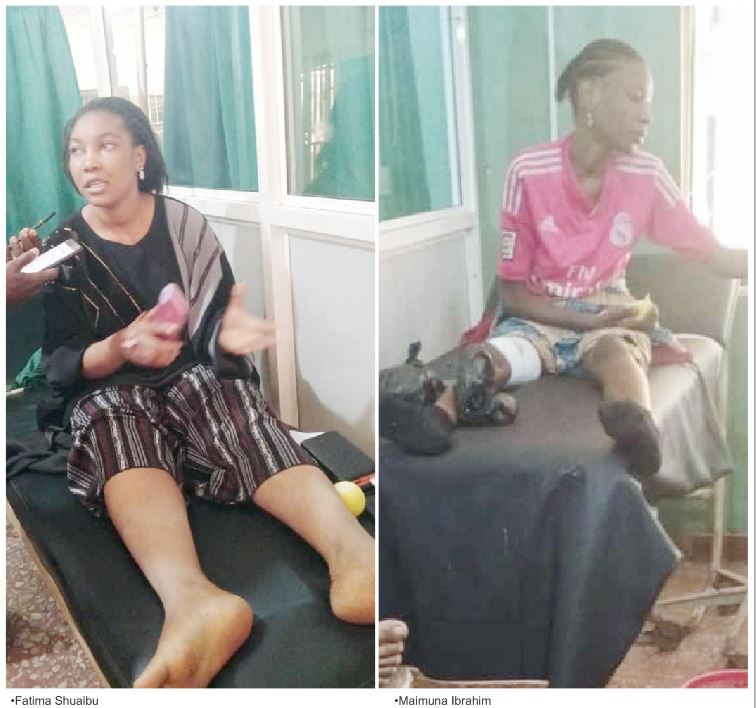…Policemen onboard removed their uniforms, disguised as travelers
The survivors recounted how the bandits overpowered the inbound security personnel and took charge of the train. One of the survivors, Shuaibu Adamu Alhasssan said, the policemen on board gave a good fight, but they later removed their uniforms and joined passengers in lying under seats.
Alhassan revealed two people who sat beside him on the train were hit by the bandits’ bullets, adding that, he escaped being shot as corpses of slain passengers fell on him, shielding him where he laid down.
He said, “When they shot the lady beside me, I lied down immediately, then somebody fell on me. The corpse of the lady beside me fell on that person, and I was beneath both of them. That served as a cover for me. While the bandits shot sporadically, none of the bullets hit me.”
According to Alhassan, though he was neither shot nor kidnapped, the one hour and 15 minutes of the attack was the most traumatic moment of his life.
“You are sitting close to somebody this minute, and the next minute, they are hit by a bullet, without you also knowing your chances of survival,” he said.
Alhassan continued, “The train left Kubwa station at exactly 6:30 pm, and the journey was smooth as usual until we got to Jere, then the train started slowing down and we were wondering what was happening because there was no sign of passengers boarding the train. Then it started moving again, and at exactly 7:50, we heard an explosion. The train derailed and stopped. Before it could stabilize, we started hearing gunshots, and everybody became confused. The train stopped and the bandits took over the train. They boarded Coach 17; when they entered, they shot some people, then they came to our coach.
“As I was lying down, I heard one of them saying Musa, why did you shoot this person? He responded saying he is wasting my time. After 1 hour, and 15 minutes, we sensed the presence of the military. I had never believed that the Nigerian army could be so responsive, they maneuvered their way through the forest to get to our location. They came with over 30 Hilux vans with senior military officers. They started exchanging fire with the bandits, and after some time, the bandits stopped shooting. The soldiers boarded the train and told us that they had taken over the train and we were safe. Subsequently, they started moving those that were injured out. There was blood everywhere on the train.
Recalling the gallantry of the policemen attached to the train, Alhassan said, “When trouble started, the policemen on the train, actually tried their best, but from my estimation, they were not more than seven, so they positioned themselves. They went close to the doors and started exchanging fire with the bandits. When they discovered that the firepower of the bandits was overwhelming, they ended up removing their uniforms and everything that will identify them as security agents, then they joined us in lying down. Sincerely, the bandits had superior firepower, there was nothing the policemen could have done.”

The bandits, he noted, were between 18 and 20 years of age. He said, “They were speaking Fulfude and Hausa. It was only God that saved us. There was no mobile network within the vicinity, except for Etisalat and Airtel which were fluctuating. So it was difficult to call for assistance. It got to a point that when anyone attempted to make a call, and they see a sign of phone light from outside, they just shoot towards that direction.”
“We can’t say how many people died, but they were many, as we struggled to avoid stepping on corpses as we were been rescued. The soldiers really tried because they took us up the hill after being evacuated from the train. They carried several people that sustained injuries on their backs. We also helped in carrying children whose parents were kidnapped, while some people could not find their children.
“Soldiers took over the entire area; we saw some of them in the bush, strategically positioned to respond to any emergency. Then they started moving us in batches in their vehicles to the main road. Later, they advised that those of us that were not injured should walk, and we were surrounded by soldiers. The Nigerian Army provided about 10 buses and ambulances to convey us to safety. They took us to the hospital. Before our arrival, the army’s medical team was already on alert to receive us. So, none of the injured people was left unattended.

